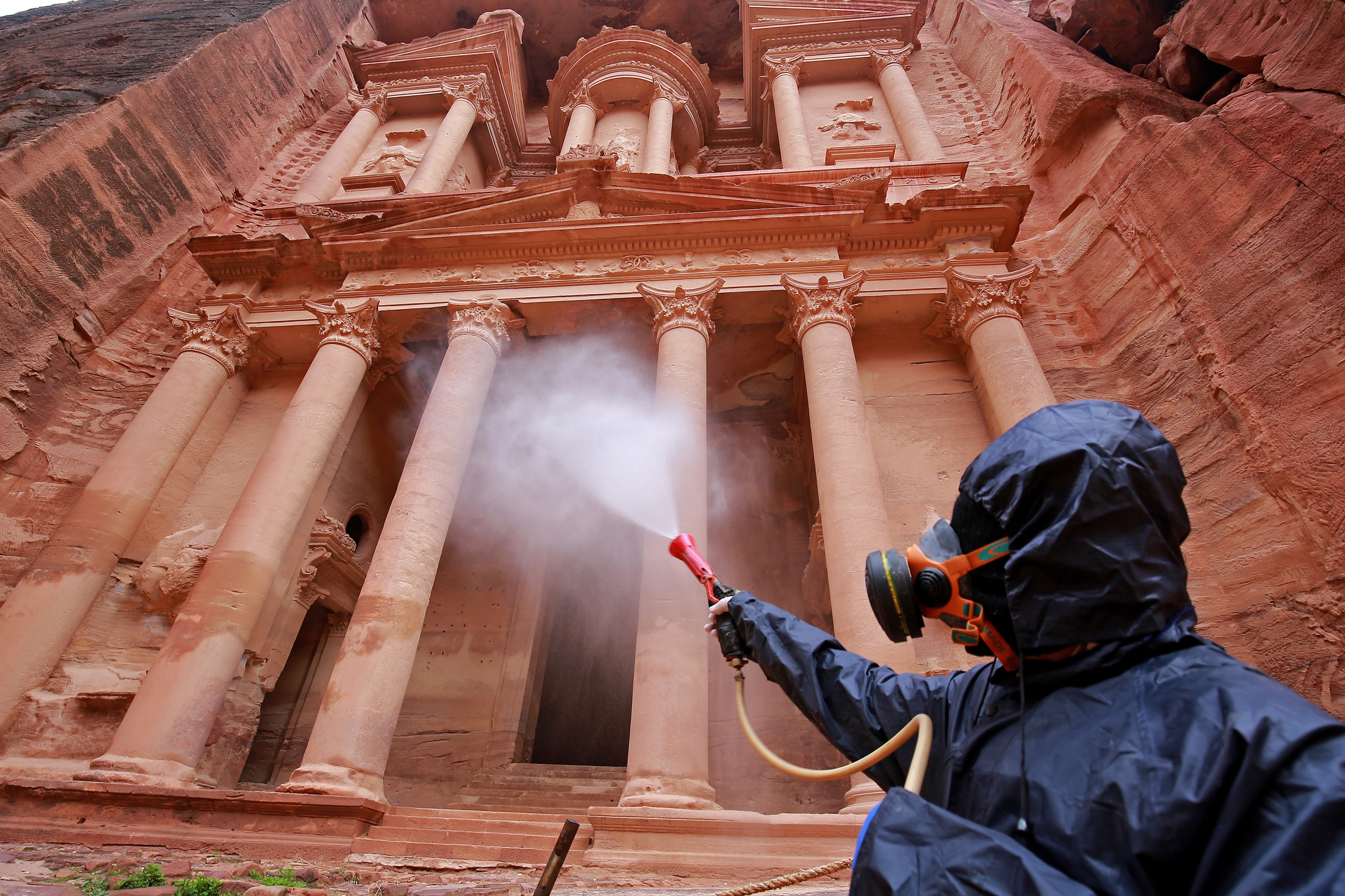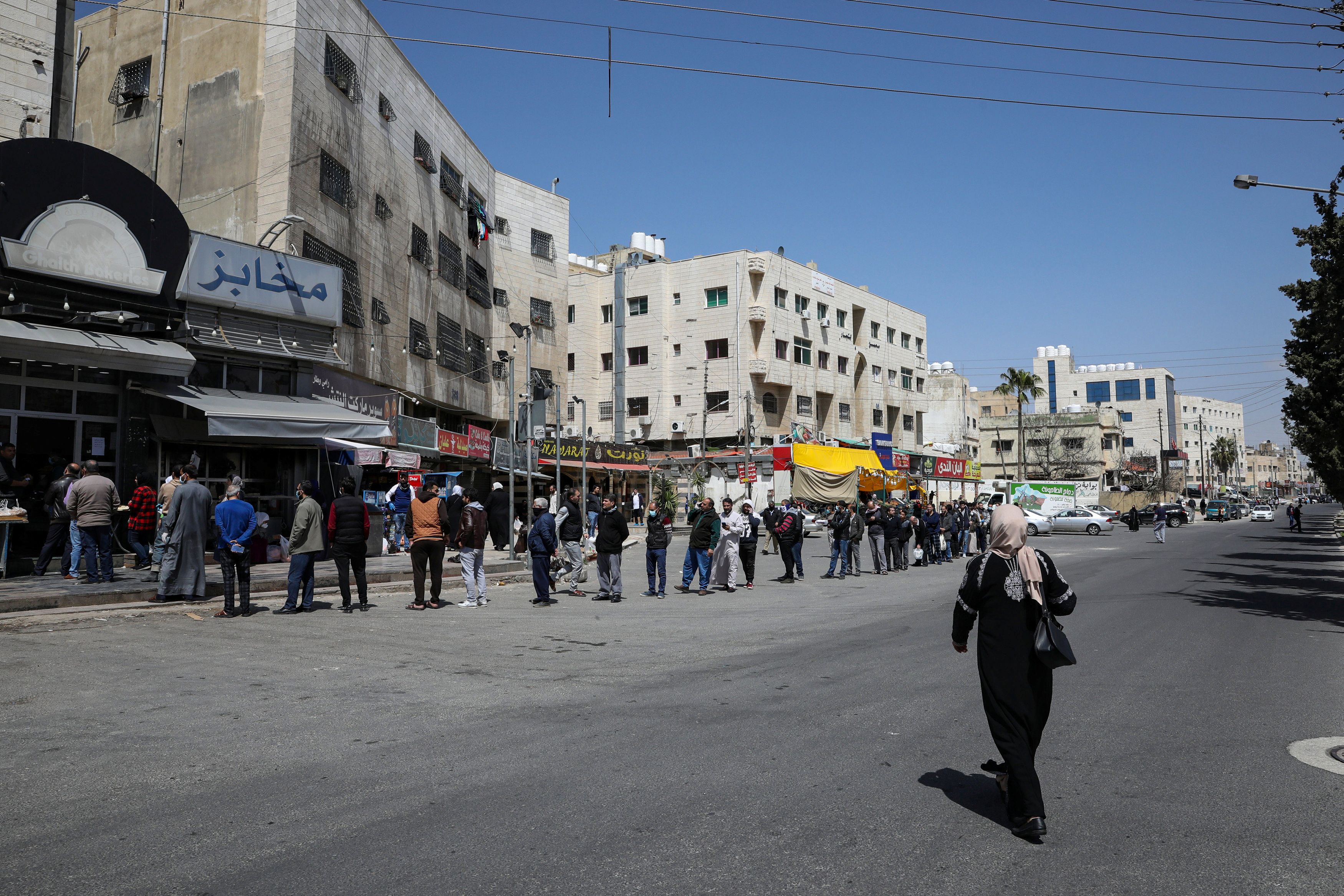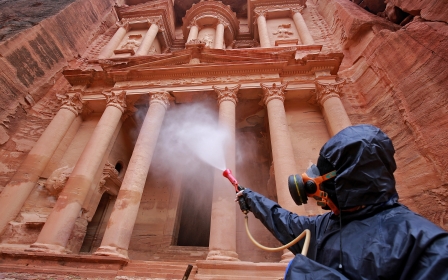Coronavirus: Jordan's ailing economy rocked by spread of virus

Just weeks ago, analysts predicted that Jordan’s gross domestic product would grow this year after a turbulent period of mass protests over austerity measures hit Jordanians hard and eventually brought down the previous government.
But economists say the coronavirus - and measures put in place to prevent its spread including flight bans and strict curfews - have thrown the kingdom’s recovery into jeopardy, leaving many in the private sector scrambling to assess the ongoing damage.
New MEE newsletter: Jerusalem Dispatch
Sign up to get the latest insights and analysis on Israel-Palestine, alongside Turkey Unpacked and other MEE newsletters
Some of the hardest hit will be those operating in Jordan’s tourism industry which attracted nearly five million visitors in 2018. The sector accounts for 12.5 percent of the kingdom’s overall GDP, keeping more than 50,000 in work, according to government figures.
“There is no doubt that the Jordanian tourism sector will suffer from severe consequences due to the lockdown,” Amman-based political economist Laith Aljouni told Middle East Eye. “With this crisis coming, many people working in the sector might lose their jobs and many small businesses might shut down.”
Take Ghassan Qadi, who had only recently opened Amman-based travel agency, Renaissance Viaggi, and was expecting to host 50 groups from Italy next month.
That’s now out the window, along with any near-future prospects as thousands of tourists cancel hotel and car bookings across the kingdom
Meanwhile, 5,000 others, who arrived in Jordan before a nationwide lockdown, are currently quarantined in luxury hotels near the Dead Sea and in the capital.
Qadi estimates that his company has already lost 30,000 Jordanian dinar ($42,313). “We are out of any kind of business. I guess this year is over for us,” Qadi said.
Mohammad Abu Zeiad, sales and marketing manager at Auto Nation Rent a Car in Amman, said his company has had to fire many of its employees to cover thousands of dinars in losses and he doesn’t expect the situation to pick up anytime soon.
“Tons of reservations have been cancelled even for the months of May, June, July and August, which are the high season for us,” he told MEE. “We will not recover until four months at least.”
Unbudgeted spending
Jordan’s economy was already in a tight spot long before the coronavirus.
Since 2016, the kingdom has implemented strict economic reforms to meet indicators established by the International Monetary Fund (IMF) under a 3-year, $723m economic aid package.
The measures, including tax increases and rolled back subsidies, sparked months of protests, the biggest since the 2011 Arab uprisings, and eventually saw the resignation of Prime Minister Hani Mulki in June 2018.
The agreement was renewed earlier this year for a new total of $1.3bn and officially approved this week. Though the package was agreed ahead of the pandemic, the IMF said the move will help support unbudgeted spending now resulting from the virus.
It will be needed, according to Ajlouni. “The pandemic will increase the pressure on Jordan’s public finances, pushing the already existing threats to their limits,” he told MEE.
In addition to public spending, the anticipated increase in GDP predicted earlier this year has been shattered by the coronavirus with its own consequences, he said.
Unemployment will increase, government revenues will decrease and, with the required increase in public spending, Jordan’s credit rating may be downgraded, raising the cost of public debt in the long run.
'Being responsible for a team and their families in a time of limited income is a huge burden on any company'
- Tamer al-Masri, JoBedu founder
To confront the crisis, authorities have taken several measures, including a $775m economic injection from the Central Bank of Jordan.
However, Ajlouni said, this is not a direct injection, but rather reduced the mandatory amount of cash reserves that banks will have to deposit with the central bank from 7 to 5 percent.
So it won’t have an impact on the government’s finances, but rather will encourage the banking sector to reduce the costs it passes on to its clients, including loan and credit payments.
Jordanian authorities have also introduced several measures that will specifically reduce the impact on the private sector. Business owners have a three-month pause on paying their employees’ social security subscriptions and the minister of finance has postponed collecting sales tax from all local businesses.
Other measures include lowering interest rates on all monetary policy instruments, halting trade on the Amman Stock Exchange to preserve stock values and trying to reassure the public that the country has enough supplies to face this lockdown and the halt of productive activity. The minister of finance said that the government has enough gasoline and diesel reserves for two months.
“I believe that the government of Jordan used all the available tools to help the private sector to survive this crisis, but yet it will suffer in the coming days since it will be harder for them to sustain their fixed costs,” said Ajlouni.
The fear in the private sector and, particularly, among small and medium-sized businesses is tangible.
Community support
Over the course of a few days, Tamer al-Masri, founder and CEO of JoBedu, an Amman-based streetwear brand, watched his business slow down, bit by bit.
“We started working from home one week before the quarantine was declared,” he told MEE. “Our stores were open, but we started reducing hours and the number of workers.”
Then, two days before the lockdown, he said, they closed their stores, the factory and the printer altogether.
“Being responsible for a team and their families in a time of limited income is a huge burden on any company,” Masri said.
Many businesses moved operations online, but all delivery services offering shipping have been suspended in the kingdom making it impossible to fill orders.
While Masri acknowledges that there will be undoubtedly heavy consequences on his company, he said he prefers to focus on the positive.
“JoBedu is built as a social obligation to entertain the masses and be something positive in people’s lives," he said.
"Right now we are working with JoBedu radio, a community radio where anyone can be the DJ for few hours,” he said of one of the initiatives taken by JoBedu to support the community.
Osama Sabbah, a senior sales manager at Fanillah Apparel, a clothes and accessories business in Amman, said he believes the government’s measures will support businesses for a few months, but he’s feeling the pressure.
Many of Fanillah’s marketing contracts have been cancelled as a result of the virus, a loss totalling around $42,000 so far.
Jordan’s workforce
Despite the downturn, Osama Abu Zain Edden considers himself “lucky”.
He had plans to open Red's, a pub located in Amman’s popular Webdeh neighbourhood, at the end of March but was forced to postpone due to the measures implemented to contain the spread of Covid-19 in the country.
“It is better for us that we did not open, since right now we do not have to pay many of the costs,” he said.
But he still worries about consequences for workers across the country who he sees as most vulnerable in the current climate.
“For instance, waiters do not live only out of their salaries, but especially from the tips they receive from customers. They do not have coverage, but they have families to maintain. The government should do something about it,” said Zain Edden.
According to Ajlouni, 53 percent of Jordan’s workforce currently earn a living by working in informal markets, where workers, in sectors like agriculture or construction, do not have contracts and are not covered by social security.
In an attempt to reduce the consequences on the poorest households, the Jordanian government established official prices for different commodities, including bread and vegetables.
According to Basma Ishaqat, minister of social development, around 350,000 families have received financial and in-kind support since the virus outbreak.
Earlier this week, the government also started to distribute basic commodities including bread and water using Greater Amman Municipality buses. However, the crowds drawn to the handouts raised doubts about whether this was the best method in a new era of social distancing.
As everyone assesses how best to proceed, some business owners say the crisis may have its silver linings for the private sector.
This is an opportunity to re-evaluate expenditures and see which ones were luxuries and which were strategic, he said.
“Even if we have zero cases of coronavirus in Jordan soon, that does not mean that our borders are going to open because the world needs to be cleared,” he said. “What is happening right now is a social economic earthquake that has not stopped yet.”
Middle East Eye delivers independent and unrivalled coverage and analysis of the Middle East, North Africa and beyond. To learn more about republishing this content and the associated fees, please fill out this form. More about MEE can be found here.







